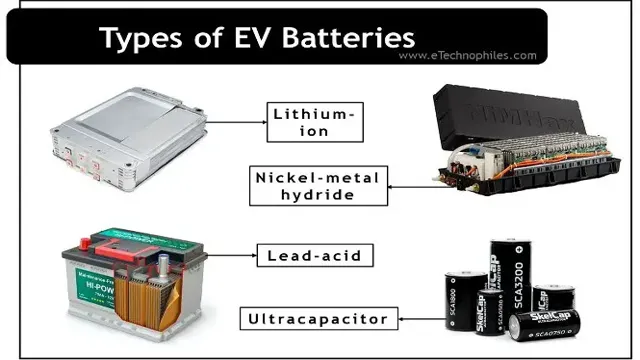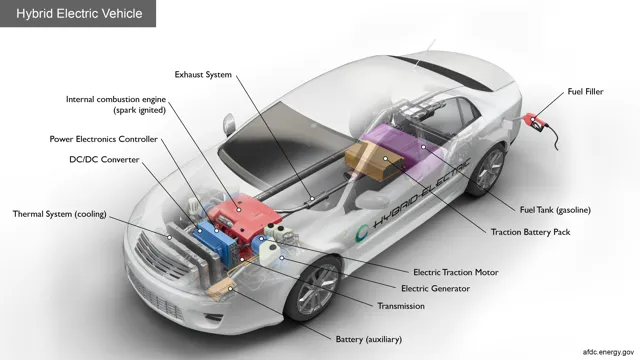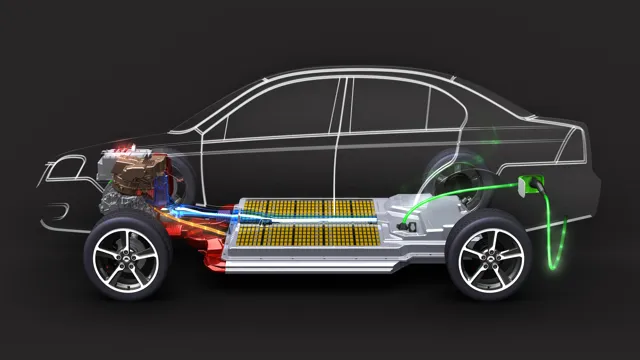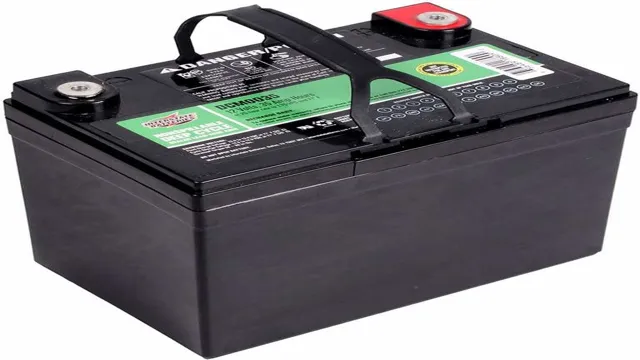Powering Up: Exploring the Different Types of Batteries Used in Electric Cars
Electric cars are becoming increasingly popular due to rising awareness around climate change and dwindling fossil fuels. Unlike traditional gasoline-powered vehicles, electric cars are powered by rechargeable batteries. A critical aspect of electric vehicles is the type of battery they use, and the performance it provides.
Today, we will explore batteries in electric cars, and what makes them so unique. Are you curious to learn more about the technology behind electric vehicles? Let’s dive in!
Overview of Electric Car Batteries
When it comes to electric cars, there are several different types of batteries that can be used. The most common type of battery found in electric cars is the lithium-ion battery, which provides a high energy density and long battery life. Other types of batteries that can be used in electric cars include nickel-metal hydride batteries and solid-state batteries.
Nickel-metal hydride batteries are often used in hybrid and plug-in hybrid electric cars, while solid-state batteries are a newer technology that is still being developed. Each type of battery has its own advantages and disadvantages, and the choice of battery used in an electric car can depend on factors such as cost, performance, and safety.
Lithium-Ion Batteries
Lithium-ion batteries are the most common type of electric car battery used today. These batteries are made up of a cathode, an anode, and an electrolyte. Lithium-ion batteries have a higher energy density than lead-acid batteries, which makes them a popular choice for electric vehicles.
They are also more environmentally friendly as they don’t emit harmful gases like lead-acid batteries do. Lithium-ion batteries are relatively safe, but they can still be dangerous if they are damaged or overheated. They can also be expensive to replace, so it’s important to take care of them properly.
Proper maintenance includes avoiding deep discharges and keeping the battery at a moderate temperature range. Overall, lithium-ion batteries are a crucial component of electric cars, providing the necessary power to drive the vehicle.
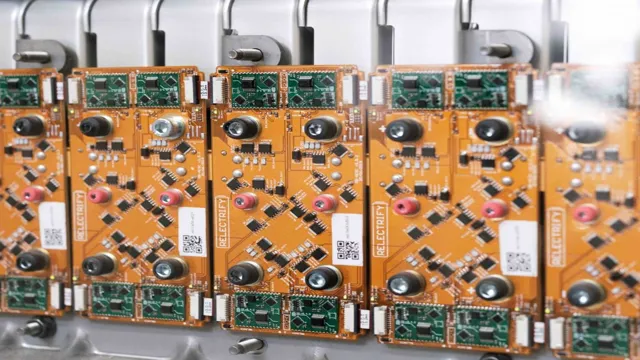
Nickel-Metal Hydride Batteries
Electric car batteries come in various types, but one popular option is the Nickel-Metal Hydride (NiMH) battery. NiMH batteries have been used in electric vehicles since the early 2000s, and they offer a decent balance between efficiency, cost-effectiveness, and environmental sustainability. They are often cheaper than their lithium-ion counterparts, but they still offer enough power and range for most commuter vehicles.
Additionally, NiMH batteries are quite durable and have a relatively long lifespan, making them a reliable choice for electric vehicle manufacturers. Despite their advantages, NiMH batteries are still less energy-dense than lithium-ion batteries, meaning that they take up more space and weight in an electric car. Nonetheless, their relatively low cost and high durability make them a practical option for those who want an eco-friendly vehicle without breaking the bank.
Solid-State Batteries
Solid-state batteries are a promising advancement in electric car battery technology. They are seen as the next generation of batteries by numerous experts as they offer a higher energy density. With this technology, electric cars will be able to go further on a single charge.
Additionally, solid-state batteries will be safer compared to traditional lithium-ion batteries as they remove the flammable organic solvents that are used in electrolytes. This eliminates the risk of fire incidents. The primary material utilized in solid-state batteries is lithium.
Compared to traditional batteries, solid-state batteries have a higher thermal conductivity, lower self-discharge rates, and a longer lifespan. However, this technology is still in its early stages, and its commercial availability is limited. If researchers can improve the manufacturing process and reduce the production cost of solid-state batteries, automakers will be able to eventually mass-produce electric cars with them installed.
That could mean a major boost to the electric vehicle industry and a major shift towards a cleaner and more sustainable future.
Advantages and Disadvantages of Different Batteries
Different types of batteries are used in electric cars, each with its own advantages and disadvantages. Lithium-ion (Li-ion) batteries are the most common type of battery used in electric cars due to their high energy density and long lifespan. They are also the lightest type of battery, making them ideal for use in electric vehicles.
On the other hand, lead-acid batteries are cheaper but have a shorter lifespan and lower energy density. Nickel-metal hydride (NiMH) batteries were once popular but are less common now due to their lower energy density and shorter lifespan compared to Li-ion batteries. Solid-state batteries are a new type of battery that are more efficient, safer, and have a longer lifespan than Li-ion batteries.
However, they are currently more expensive and less widely available. Ultimately, the choice of battery depends on factors such as cost, performance, and availability. As electric cars become more popular, advancements in battery technology will continue to be made, providing even more options for drivers.
Lithium-Ion Batteries
Lithium-Ion Batteries When it comes to batteries, there are several options available to power your devices. One of the most popular choices is the Lithium-Ion battery, and for good reason. They are lightweight, have a high energy density, and hold their charge well.
Plus, they can be recharged many times without losing performance. However, like any technology, there are also some downsides to Lithium-Ion batteries. One issue is that they are expensive to manufacture, which can lead to higher costs for the end-user.
Additionally, they are known to be more volatile than other battery types, which can lead to safety concerns if not handled properly. Overall, though, the advantages outweigh the disadvantages, and Lithium-Ion batteries will likely continue to dominate the battery market for years to come.
Nickel-Metal Hydride Batteries
When it comes to rechargeable batteries, there are many different options to choose from. One popular type is the nickel-metal hydride battery, which offers several advantages over other types of rechargeable batteries. For starters, nickel-metal hydride batteries have a higher energy density than their predecessors, nickel-cadmium batteries.
This means they can store more energy and last longer between charges. Additionally, nickel-metal hydride batteries are better for the environment than other batteries, as they contain less toxic metals. However, there are also some disadvantages to using nickel-metal hydride batteries.
They can be more expensive than other types of rechargeable batteries, and they can also suffer from voltage drop issues. Despite these drawbacks, many people choose nickel-metal hydride batteries for their high energy density and eco-friendly properties.
Solid-State Batteries
Solid-state batteries are a type of battery that utilizes solid electrodes and electrolytes instead of liquid or gel ones. They offer several advantages over traditional batteries including higher energy density, increased safety, and longer lifespan. Solid-state batteries also have the potential to be more environmentally friendly due to their ability to use more abundant and sustainable materials.
However, they are currently more expensive to produce than traditional batteries, which limits their widespread adoption. Additionally, there are still some technical challenges that need to be overcome before solid-state batteries can become a practical alternative. Despite these challenges, solid-state batteries show great promise for the future of energy storage and may play a significant role in the transition to renewable energy sources.
Future of Electric Car Batteries
As the demand for electric cars continues to rise, the technology behind their batteries is evolving at a rapid pace. Today, there are several different types of batteries used in electric cars, each with their unique strengths and weaknesses. Lithium-ion batteries, the most commonly used type, offer high energy density and long-lasting performance.
However, they can be expensive to manufacture and have a limited lifespan. Solid-state batteries, on the other hand, are still in development but offer the potential for increased energy density, longer lifespan, and improved safety. Moreover, flow batteries and sodium-ion batteries are also being explored as potential alternatives.
The future of electric car batteries will likely involve a combination of these different types, with newer technologies replacing or augmenting existing ones over time. This will not only improve the performance and range of electric vehicles but also make them more affordable and accessible for people around the world.
Emerging Technologies
The future of electric car batteries is looking bright with the emergence of new technologies. One of these technologies is solid-state batteries, which promise to offer higher energy density, faster charging times, and improved safety compared to traditional lithium-ion batteries. With solid-state batteries, the electrolyte material is solid rather than liquid, which makes them less prone to leakage or overheating.
Another promising technology is lithium-sulfur batteries, which have the potential to store more energy at a lower cost than lithium-ion batteries. These batteries work by using sulfur as the cathode instead of the more expensive metals used in traditional batteries. The development of these emerging technologies could revolutionize the electric car industry and pave the way for faster, cheaper, and more efficient electric vehicles on our roads.
Charging Infrastructure
One of the greatest limitations of electric vehicles is their range, which is affected by the capacity and lifespan of the car battery. However, there is good news for all EV enthusiasts out there. The development of solid-state batteries is the future of electric car batteries.
These batteries will provide lighter weight, have a longer lifespan, and offer higher energy density, giving electric vehicles the longer range they need without the added weight. Another exciting development is the use of wireless charging technology in public chargers, providing a more convenient and accessible way to charge electric cars. As charging infrastructure grows, it will be convenient for people to charge their electric cars while parked, similar to getting gas.
These advancements are encouraging and will meet the growing demand for EVs.
Conclusion
In conclusion, the world of batteries for electric cars is diverse and constantly evolving. From the ever-present lithium-ion batteries to the up-and-coming hydrogen fuel cells, each type offers unique advantages and challenges. It’s like a world-class buffet of batteries, with each dish offering a new flavor to tantalize our taste buds.
Whether you prefer the tried and true, or are willing to try something bold and different, the choice is yours when it comes to powering your electric vehicle. As the world moves toward a more sustainable future, we can be sure that the batteries powering our cars will continue to innovate and surprise us, just like the world of cuisine. Bon appétit, electric car enthusiasts!”
FAQs
What are the main types of batteries used in electric cars?
The main types of batteries used in electric cars are Lithium-ion, Nickel-Cadmium, and Lead-acid.
What are the advantages of using Lithium-ion batteries over other types in electric cars?
Lithium-ion batteries are more energy-dense than other types, have a longer lifespan, and are less prone to self-discharge.
Are Nickel-Cadmium batteries still used in electric cars?
Yes, Nickel-Cadmium batteries are still used in some electric cars, although they have largely been phased out due to the availability of more efficient and environmentally friendly options.
What are the disadvantages of using Lead-acid batteries in electric cars?
Lead-acid batteries are heavier and less energy-dense than other types, meaning they have a shorter driving range and require more frequent charging. They also have a shorter overall lifespan.
